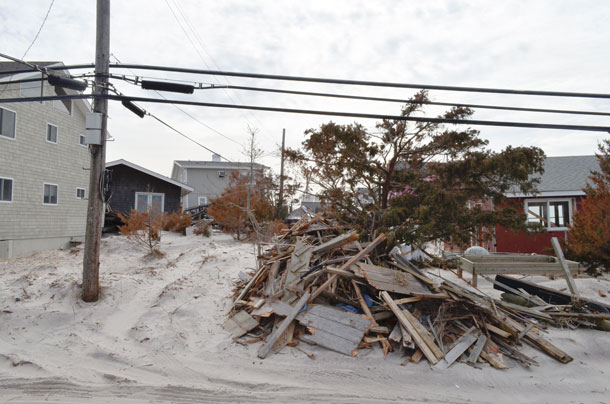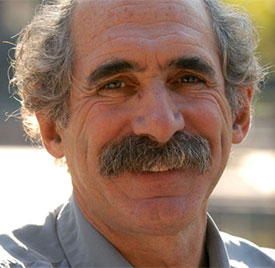Global Warming Is Heating Up
Air Date: Week of October 12, 2018

The newest Intergovernmental Panel On Climate Change Special Report details what even a half degree of additional planetary warming would mean for societies around the world. (Photo: See Ming-Lee, Flickr CC-BY-NC 2.0)
A special report issued by the Intergovernmental Panel on Climate Change (IPCC) on October 8, 2018 spells out the need to move quickly to curtail global warming to no more than 1.5 degrees Celsius from pre-industrial levels, though the 2015 Paris Climate Agreement formally adopted 2°C as a target with 1.5°C as an “aspiration.” This IPCC report details the dire climate impacts that could occur if global average surface temperatures rise to 2°C compared to a 1.5°C increase. Host Steve Curwood speaks with Princeton Professor and geophysicist Michael Oppenheimer, who has been a lead author for many IPCC reports, about what overshooting the 1.5°C threshold could mean for societies around the world.
Transcript
CURWOOD: It’s Living on Earth. I’m Steve Curwood.
Hurricane Michael quickly blew up into a devastating Category 4 storm as it entered warm waters in the northern part of the Gulf of Mexico. It’s yet another example of the increasing number of major weather events linked to climate disruption. And according to a recent report from scientists with the Intergovernmental Panel on Climate Change, the IPCC, we can expect more and more dire events such as Michael with only seemingly small increases in the globe’s average surface temperatures. The 2015 Paris Climate Agreement called for no more than a 2-degree centigrade increase from pre-industrial conditions and suggested limiting the rise to 1.5 degrees would be beneficial, but this new report finds that half degree difference poses huge risks. Keeping below that 1.5°C goal is going to be tough, but the impact of failure will be even tougher, says Princeton Professor Michael Oppenheimer. Professor Oppenheimer has been a lead author for IPCC reports for years and joins us now. Welcome back to Living on Earth Michael!
OPPENHEIMER: Glad to be here again.
CURWOOD: Let me cut to the chase. How scared are you by this latest report from the IPCC?
OPPENHEIMER: I don't get scared about this issue because I've been living with it for 35 years, and if it scared me I would have gone crazy a long time ago. However, any sane person would take away a very very sobering message upon reading this report. The effects of climate change are already here. They are projected to worsen over time and the point at which the risks related to climate change, that is that the possibility of very big impacts starts to increase markedly, is not toward the end of this century, but very close, a matter of a decade or two away, if we do nothing or more or less nothing like we're doing now to reduce the emissions of the greenhouse gases that are causing the problem.
CURWOOD: So, what's the basic premise of this report, and why was it issued in the first place?
OPPENHEIMER: This report has an unusual origin. The Intergovernmental Panel on Climate Change produces thorough assessments of all our knowledge on climate change every six years or so. And then in between those major assessments, it produces very quick and pointed assessments of pieces of the problem. For instance, I'm working on the next - these are called special reports - and I'm working on the next special report which is on the oceans and the icy parts of Earth like the ice sheets. The report that just came out is on the question of what is the level at which we should restrain warming in order not to enter a danger zone with the risk just so high that we may just as a group of societies not be able to cope with it. That's unusual because it's pointed at a single very specific issue that has high policy relevance.
CURWOOD: Now, one of the headlines from this latest IPCC report is that we have just a dozen years, 12 years or until 2030 or so to get our act together to reach a net zero output in carbon emissions. To what extent do you agree with that finding and how do we possibly get there?
OPPENHEIMER: To be frank about it, I don't think we're going to get there, and I also think that, partly because of that the framing that we have 12 years left or else is wrong. It's counterproductive, it will just scare people. The report doesn't frame it that way that's been a framing that the media has put on it, sort of like 12 years of we don't do we should do, the world comes to an end. That's not the case. The reality is at every step you do the best you can and if you don't quite make the target, you try to do a little better in the next decade or the next couple of decades. The world doesn't come to an end because of this. The risk just increases markedly and it becomes very very hard to cope eventually. That doesn't mean that societies will completely disintegrate. Some will. I can tell you that sea level rise is going to destroy some coastal societies particularly on small island states, but it will make life just miserable, expensive, and uncomfortable for the rest of us.

Hurricane Sandy debris on Fire Island in New York. Strong storms like this one will become more common with increased ocean warming. (Photo: USACE NY, Flickr CC-BY-NC 2.0)
CURWOOD: So, what are the biggest challenges in this report in terms of limiting warming to a degree and a half centigrade?
OPPENHEIMER: Contrary to what most people think, the report finds that the challenges are not primarily technological. The costs are going to be decreasing over time, although they're never going to be entirely negligible. But the real obstacle is a social and political one. How do you get societies organize to actually reinvent themselves to be not independent of fossil fuels?
CURWOOD: You're saying the primary challenge is to limit warming to 1.5 degrees Centigrade is us. What in fact do we need to do then as societies, as governments, to limit this warming. I know there are many many aspects to it, but briefly, what do we need to do?
OPPENHEIMER: At the most general level what we need to do is abandon using fossil fuels as primary energy sources. That means getting rid of coal the primary source of carbon dioxide from electric power production, for instance, as soon as possible, reducing and eventually eliminating our dependence on petroleum based products like gasoline primarily for transportation and probably the biggest challenge is that there's so much carbon dioxide already in the atmosphere that even if we slow down markedly and eliminate our dependence on fossil fuels, we probably need to find a way to remove some of that carbon from the atmosphere eventually. Not immediately, but as we get toward mid century it seems we're going to need a way to suck the carbon dioxide out of the atmosphere, and people are working on that. So, those are two things. The third thing is becoming more efficient, and that means not just efficiency in production, it also means societies organizing themselves efficiently. For instance, in the United States, we have a very spread out pattern of development and that pattern automatically guarantees high energy use.
CURWOOD: So, tell us why two degrees Centigrade would be even worse than the already ambitious goal of 1.5 degrees Centigrade. Why does just half a degree make such a difference according to this particular report?
OPPENHEIMER: So, when the report was called for in 2015, a lot of scientists were skeptical that there would be much of a difference in the impacts between 1.5 and two degrees, but because of the government's call for the report, a lot of scientists went out and started doing a research focus specifically on the difference between 1.5 to two degrees. It's become clear that particularly with regard to extreme heat and flooding that there are big differences between 1.5 and two degrees. Let me give you an example. Already by 1.5 degrees there are places particularly islands in the Pacific and mega cities all around the world for which the incidence of the benchmark hundred-year storm or hundred-year flood event I should call it, increases markedly even by 1.5 degrees so that you're getting at that level what is today a hundred-year event becomes a yearly event. Think about that. We don't deal with those kinds of events effectively now even though they are very rare. What happens when they're happening all the time?

Michael Oppenheimer is a professor at Princeton University and a frequent lead author for IPCC reports. (Photo: Courtesy of Princeton University)
CURWOOD: What's missing from this report and tell me why?
OPPENHEIMER: There really isn't much of a social and political analysis. There isn't much discussion of the political and social obstacles. There is discussion of the need for transformation, but not that much discussion of how you go about it in particular places and why it's difficult to do. And the reasons for that are, number one, it's different in every place. The IPCC can't do a special report for every place on Earth, and number two, many political leaders have regarded this as an unpopular thing to do, and they don't want to start digging into some of these very basic political reasons. So, IPCC did the best they can do given its charge.
CURWOOD: What gives you hope? What makes you an optimist, Michael Oppenheimer, about climate disruption?
OPPENHEIMER: The most optimistic thing is that we've seen a revolution start to happen in the energy system of the world. and particularly the US where coal for reasons that have nothing to do with climate change by and large is decreasing in importance as a fuel in the US and increasing penetration of renewable energy into the market. We're seeing rapid development in the storage capacity, particularly for electricity. So, we're in the middle of that revolution now, and with some push from government both on the regulatory front and on the research and development front, we can make this happen even faster than it's happening right now. So, there's one reason for optimism. Another is if you step back and look at human history, human beings are very clever at creating dangerous messes and then almost as good as cleaning them up afterwards. The analogy which is the most promising one, is what happened with the nuclear arms race where we haven't put the genie back in the bottle, and something could still go wrong, but we significantly reduced the risk of a large scale nuclear exchange, which is essentially making the Earth uninhabitable. And so, you know, you can look at that as, what, is that encouraging. And I think yes it is. That human beings are smart sometimes and are able to see their mistakes and act collaboratively as countries in the same soup to get out of the soup.
CURWOOD: Michael Oppenheimer is a Professor of Geosciences and International Affairs at Princeton University. Thanks so much for taking the time with me today.
OPPENHEIMER: Thanks for having me here today, Steve.
Links
Draft Summary of the October 2018 IPCC Report
Living on Earth wants to hear from you!
Living on Earth
62 Calef Highway, Suite 212
Lee, NH 03861
Telephone: 617-287-4121
E-mail: comments@loe.org
Newsletter [Click here]
Donate to Living on Earth!
Living on Earth is an independent media program and relies entirely on contributions from listeners and institutions supporting public service. Please donate now to preserve an independent environmental voice.
NewsletterLiving on Earth offers a weekly delivery of the show's rundown to your mailbox. Sign up for our newsletter today!
 Sailors For The Sea: Be the change you want to sea.
Sailors For The Sea: Be the change you want to sea.
 The Grantham Foundation for the Protection of the Environment: Committed to protecting and improving the health of the global environment.
The Grantham Foundation for the Protection of the Environment: Committed to protecting and improving the health of the global environment.
 Contribute to Living on Earth and receive, as our gift to you, an archival print of one of Mark Seth Lender's extraordinary wildlife photographs. Follow the link to see Mark's current collection of photographs.
Contribute to Living on Earth and receive, as our gift to you, an archival print of one of Mark Seth Lender's extraordinary wildlife photographs. Follow the link to see Mark's current collection of photographs.
 Buy a signed copy of Mark Seth Lender's book Smeagull the Seagull & support Living on Earth
Buy a signed copy of Mark Seth Lender's book Smeagull the Seagull & support Living on Earth

